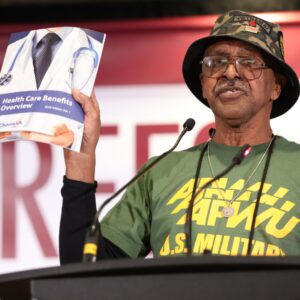February 2, 2013
The Union Veterans Council
(This article appeared in the January/February 2013 issue of The American Postal Worker magazine.)
Sue Carney, Director Human Relations Dept.
The AFL-CIO Union Veterans Council (UVC) was established in 2009 to unite union leaders and members who are veterans in a shared goal – to influence public policy to improve the quality of life for veterans and their families.
The council keeps legislators and other government officials informed of the labor movement’s positions on veterans’ issues and holds them accountable to meet the needs of military veterans. The organization also supports the appointment of labor-friendly veterans to all levels of government.
The group encourages union veterans to take leadership roles in other veterans’ organizations, and strives to form coalitions with groups concerned about veterans’ issues. The UVC is also working to help state labor councils establish their own veterans’ councils.
Currently, 33 unions participate in the AFL-CIO UVC, with each labor organization having a seat on the governing board. APWU President Cliff Guffey serves as one of two vice chairs.
Top Priorities
The UVC has made giving veterans access to good jobs one of its top priorities. Approximately 185,000 post-9/11 veterans are unemployed, and thousands of senior veterans are jobless. The unemployment rate for young, male veterans age 18 to 24 is 29.1% – 11.5% higher than non-veterans of the same age.
Access to quality healthcare is also a primary focus. With more than eight million veterans enrolled in the Veterans Health Administration (VHA) system, accessing healthcare is often a challenge. Although the VHA operates 153 hospitals and hundreds of community clinics and Veterans Centers nationwide, there are insufficient facilities for more than three million veterans living in rural areas, and the care available for female veterans is often inadequate.
Eradicating veteran homelessness is another goal of the UVC. Veterans of the wars in Iraq and Afghanistan frequently appear in homeless shelters within two years of separating from the military, and a significant percentage of the homeless are female veterans and their children.
Legislative Agenda
The UVC has an ambitious legislative agenda, which includes ensuring all regulations pertaining to employment and training for veterans are enforced; strengthening Veteran Preference laws; updating restricted jobs for preference-eligible veterans; minimizing the outsourcing of veterans’ jobs; expanding collective bargaining rights for registered nurses, physicians and clinicians employed by the VHA; upgrading the Post-9/11 GI Bill to provide all veterans with more generous benefits; ensuring that transitioning veterans are better informed about their rights; extending the Uniformed Services Employment and Reemployment Rights Act (USERRA) protections to National Guards and Reservists; extending job protections for Reservists and Guards, and protecting them from loss of seniority and leave while they receive treatment for service-connected medical conditions.
The legislative agenda also aims to fully fund and properly implement the VHA healthcare program; establish automatic enrollment for all active and reserve components; expand care in rural areas and for female veterans; ensure post-9/11 veterans and caregivers receive critical care and benefits; prioritize outreach efforts; increase funds to hire female health practitioners, mental health providers and outreach specialists; initiate research on the intergenerational effects of Agent Orange/dioxin; expand the list of maladies considered presumptive toxins; make Blue Water and Burn Pit veterans eligible for benefits; provide additional funding for the diagnoses and treatment of neuropsychiatric war injuries, particularly Post-Traumatic Stress Disorder, substance abuse, traumatic brain injury, as well as funding for suicide prevention; grant authorization to permit Veterans Centers to treat all veterans and their families, and increase center staff to include family therapists.
Sign-up
The APWU represents more than 50,000 veterans, Guards and Reservists. The Union Veterans’ Council provides a collective voice to veterans who are union members. To learn more or to sign-up to receive e-mail alerts for union veterans visit www.unionveterans.org. The UVC will keep you informed about important issues and events, and let you know when your voice is needed to make a difference.


